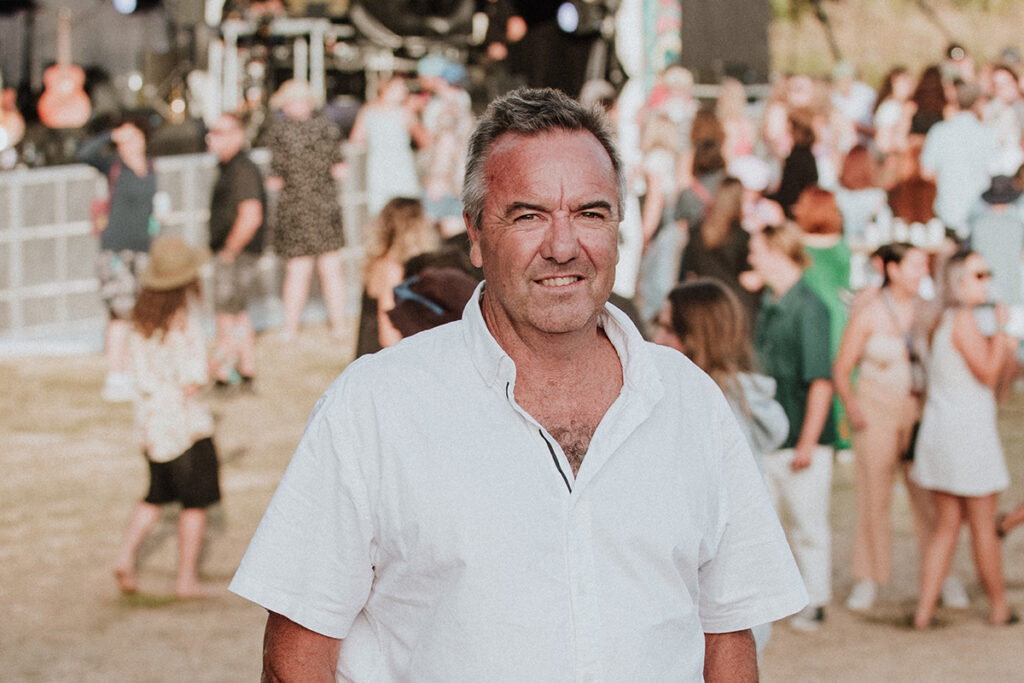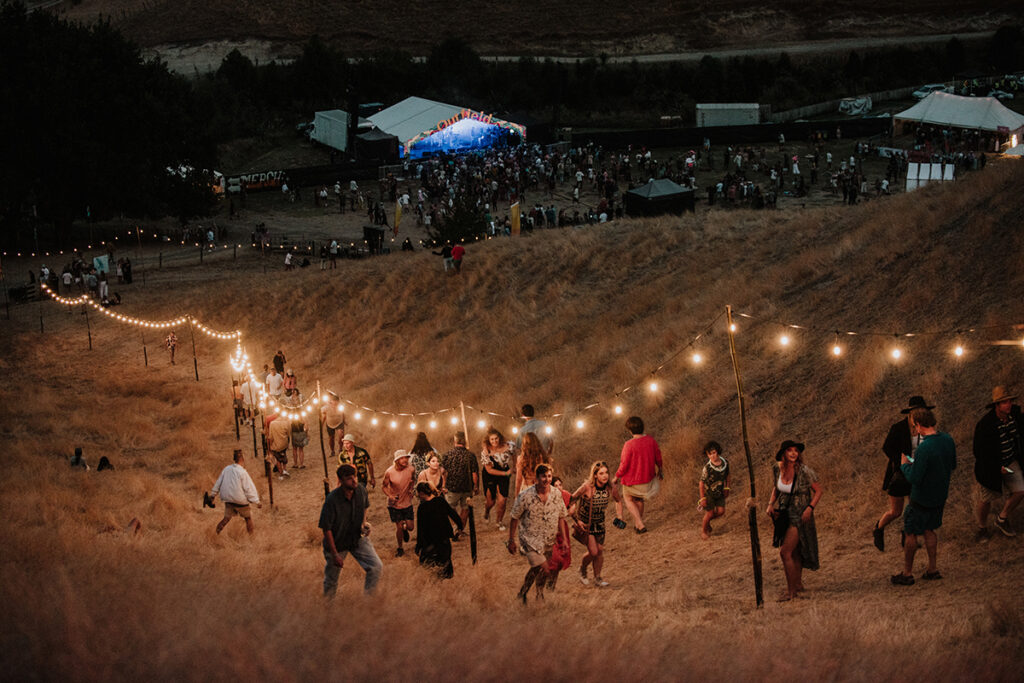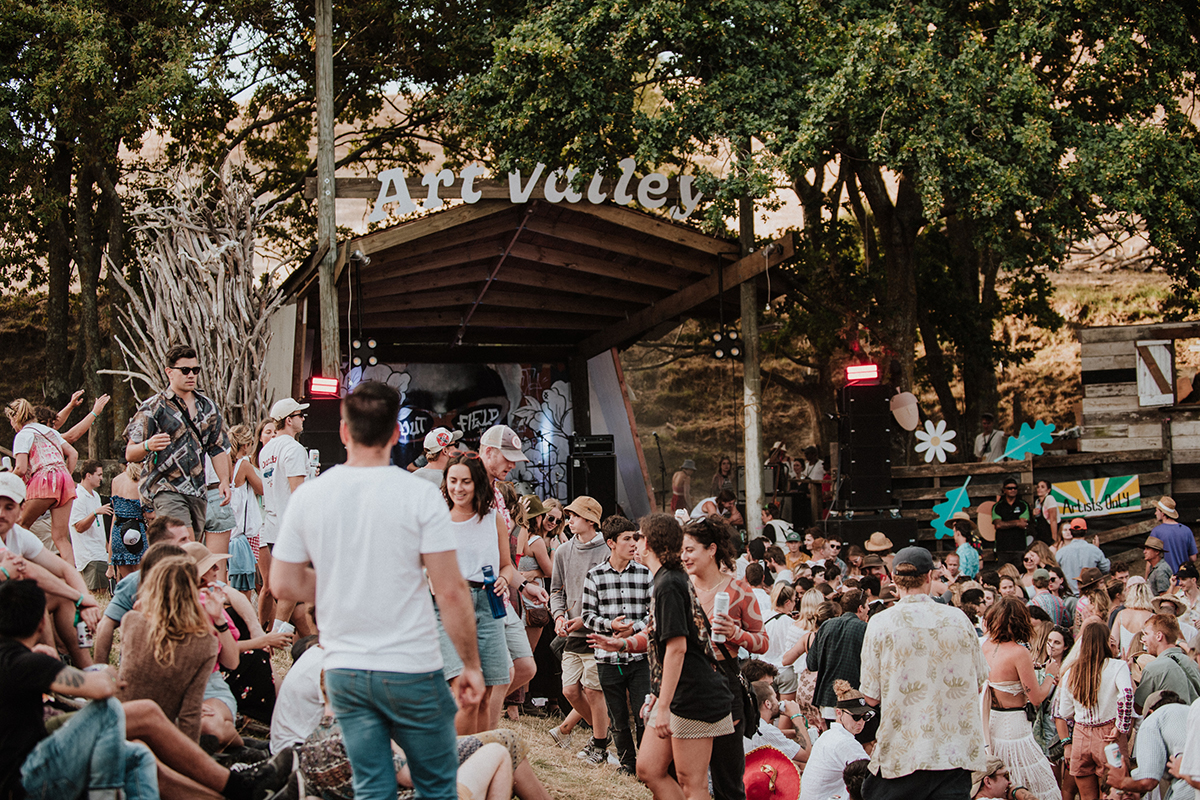The region is moving beyond single focus bursts like Art Deco week, an All Black test or a big name at the Mission Estate, with wider recognition that our capacity, resources and climate are ideal for a multitude of large events.
Napier City events manager, Kevin Murphy, says Covid brought a sharp focus to how important events are for domestic tourism. “There hadn’t been much discussion about this before, but when international events are missing you certainly become aware of it.”
Murphy provides marketing and support for around 40 events annually, and while most people know Hawke’s Bay is busy, he suggests most wouldn’t know half of what’s going on — if he has his way that’ll continue to ramp up.

He claims concerts, tours, big games and tournaments bring about $20 million annually to Hastings and Napier, and despite border restrictions Kiwi attendance remains high. He recommends Eventfinda (eventfinda.co.nz) as a trusted gig and games guide.
Hive of activity
When BayBuzz caught up with Murphy it was peak season and the region was buzzing. He’d hardly caught his breath after Christmas parades and New Year extravaganzas, Botanic Beats and Night Fiesta events in Clive Square.
Six60 were about to perform at the Hastings Showgrounds before a crowd of around 20,000 and he was putting up billboards for the Blackcaps vs Bangladesh at McLean Park and a Finn family-focused Crowded House scheduled for Church Rd Winery in March.
Dragon were just finishing quarantine ahead of their tour that included Moana Park Winery in Taradale, and the Triple Peaks 21, Aotearoa Rugby 7s, the annual Outfield music, arts and food festival at Te Awanga Downs and Art Deco week on the way.
Variations on the theme of ‘summer in the park’ were happening most weekends through until the end of March, including music at Cornwall Park and Havelock North Domain.
Murphy believes the twin cities have one of the most vibrant live music scenes in the country. Apart from hardy venues like the Common Room, Paisley Stage and the iconic Cabana, satellite bars have popped up all around the region and vineyards are regularly hosting bands.
A night or an afternoon out in the Bay might include anything from cruisy jazz, classy choristers, brass bands and bagpipes to DJs, drum and bass and hip hop, or local rock and pop units and tribute bands playing Marley, Elton John, Bowie and Pink Floyd. (Check HBmusichub.co.nz)
No cold shoulder
The shoulder period from the end of March has fewer but nonetheless significant events with the NZ Pipe Band Championships, futsal tournaments, the National Track & Field Championships (both 2020 and 2021); the Big Easy in April with about 1,500 or so cyclists expected, and in May the Hawke’s Bay Marathon attracting around 6,000 people, and the Kiwi Walk & Run Series.
Taking a phrase from the online world, Murphy says “content is king” and while venues and councils often compete there’s a growing cooperation and sharing of information.
“There are only so many event promoters taking the full risk so we need to get alongside them, understand what they want and help them deliver their events here.”

Murphy works closely with venue owners, organisers and other councils, including his counterpart at Hastings, Tanya Jackson, to ensure better regional clout.
And efforts are underway to make events an even more exacting business, including the Event Economics software from Fresh Info, which helps determine how much revenue remains in the region.
Direct financial benefits include accommodation, supermarket spend, wining and dining, entertainment, and the often forgotten hiring of marquees, sound and other equipment and services.
About eight councils using the software will eventually benefit from wider data analysis, including why people purchased tickets, how they valued the experience, and suggested improvements.
Well-rehearsed for role
Being an events manager requires good local knowledge, great contacts and networking skills and an awareness of the national sporting and entertainment scene, something Kevin Murphy has developed over decades.
He worked for NZ Customs before becoming Hastings Swimming Trust pools manager, with voluntary events management a side gig for 15 years before joining Sport Hawke’s Bay.
He worked with sports clubs; futsal, football and rugby, ran tournaments, was on the Sportslink Charitable Trust and arranged gigs for various local bands.
He and a group of friends ran the HB Sports Ball for a decade and he was involved in developing the Team Hawkes Bay brand, including creating the Come on the Bay song with Ian Morris and Hammond Gamble in 2007.
Murphy’s first contract event was Blues, Brews and BBQs showcasing craft beers and those other icons of summer, live music and sizzling grills.
Despite the hours involved in planning, set-up and marketing, he loves delivering an event and seeing people enjoy themselves.
As commercial manager for Sport Hawke’s Bay, he arranged sponsorships, funding and events, including the first A-League Football game at McLean Park in 2013 and the annual Hawke’s Bay Sports Awards.
He helped with the Tremain’s Triathlon, was “quite involved” in helping market Horse of the Year in the early years and “around the edges” of support for the Rugby World Cup and Cricket World Cup which brought serious visitor value to Hawke’s Bay.
“Even the cricket camps that are held here over summer bring in more than an All Black Test. It’s a big week with families staying for a holiday. That’s what sports tournaments do,” he says.
Late to events game
Murphy regularly attended national event conferences and became frustrated Hawke’s Bay wasn’t up with the play.
Although other councils were working with organisers and had funding to attract events, there was little engagement by Napier and Hastings until about seven years ago.
That changed when Annie Dundas arrived in 2010 as general manager of Hawke’s Bay Tourism, and key events industry people convinced her we needed a regional events strategy.
The resulting document urged local councils to get more involved; the upshot was a regional strategy group and both councils employing events managers.
In April 2015 Murphy left his role with Sport HB to join Napier City Council as events manager, tasked with ensuring the region remained on the radar when promoters planned their schedules.
The job merged his passion for sport and music, and his position on the National Event Association Board meant he knew the potential economic gains from events and bolstering bed nights.
As the go-to man for Napier, Murphy’s there to connect promoters with the right people and places, give events a promotional boost, and help cut through red tape, including the regulatory side.
That might mean coordinating street flags or putting up billboards on designated spaces. “I can use contractors but if it’s only going to take an hour – I find its often easier to do it myself.”
When pipes are calling
Among the first wins for the region under his watch was the Iron Man Marathon. “They wanted to move from Queenstown to a North Island venue, so we put our hand up early and convinced them we could provide the right support.”
The recent Pipe Band Championships at the Regional Sports Park included a three hour parade through Napier on a Friday night featuring 32 bands and about 1,500 people.

Without careful planning, including council traffic and parking management, the swirl and skirl of the bagpipers and drummers and their precision sharp left and right movements could have been a logistical nightmare.
“We needed to figure out how this would best work for the city and for them and to help them navigate through all of this,” says Murphy. A highlight for Murphy is working across councils and with Tourism HB on developing and promoting The Big Easy and Little Easy which attract about 1,500 cyclists annually. The Easter event takes advantage of the region’s interconnected cycle trails.
Another win was FAWC (Food and Wine Classic), an annual summer foody fest celebrating the best of our hospitality, cuisine and wine, which will be back for the winter version in June.
He’s involved in ongoing marketing and support for Horse of the Year, Art Deco week, the ever-evolving HB Arts Festival and other growth events like Iron Māori.
Maturity and capacity
Murphy’s impressed that so many Kiwi musicians are pulling significant crowds for tours and concerts. “Six60 jumped ahead of everyone else and now LAB are playing to crowds of 10,000, something you would never have seen a decade ago.”
He believes a number of factors are aligning. “NZ On Air, Recorded Music New Zealand and APRA are all offering support and have decent funding pots to get behind local artists and producers while promotors and venues are all wanting content … it’s all coming together”.
And he says the Hawke’s Bay scene is increasingly well-resourced with more venues supporting touring acts, and professional sound, stage, lighting and other services able to contribute to shows, concerts or tours so promoters don’t have to bring their own.
Rocket Scaffolding has built stages for Church Rd Winery events, been on the road with several tours, and is increasing its capacity for bigger acts.
“Henry Norton from Sight & Sound Services regularly puts gear into Black Barn and tops up or supplies gigs that go through Church Rd. All this helps build the region’s capacity.”
And from a venue perspective, Murphy says we’re well catered for. At the high end there’s Black Barn, Mission Estate, Church Rd, the A&P showgrounds, Hastings racecourse and the Opera House (Toitoi).
Planning ahead
Murphy’s dream event would be hosting the first major concert at McLean Park which can hold up to 25,000. Six60 passed that up for Hastings Showgrounds, so the focus is now on a significant international act once the borders are open.
McLean Park now shares Wellington Stadium’s turf farm in Palmerston North, so it can cut and paste turf for areas damaged by a stage, for example.
Murphy’s also talking with bigger stadiums, including Wellington, for back-up planning. “If Wellington had a few concerts planned and couldn’t accommodate the Hurricanes we might be in a position to pick that up.”Covid has made it extremely difficult for events managers and promoters to plan ahead for the best ‘content’ – so much is being pencilled in but nothing is nailed down.
“Next summer about four different (NZ Cricket) teams are meant to be touring. We just have to know where our gaps are and hope these plans happen. Covid has everything on pause.”
And while winter is a good time for the NRL, the Warriors are in Australia and there’s uncertainty about the 2022 season. “That’s where it pays to be working in a cooperative way with other councils and promotors,” says Murphy.
Similar “ongoing conversations” are underway around the women’s T20 World Cup in March 2022. McLean Park had been selected as a venue for the FIFA Women’s 2023 tournament until Australia got involved and it got bumped to a training venue for up to three weeks.
From a music promoter’s perspective, says Murphy, the challenge is to be ready for next summer and beyond as a lot of content is expected to come on stream in 2022-2023. “The five promoters who bring in overseas content will soon want to pencil-book stadiums.”
Accommodation dilemma
Tourism HB’s appeal to Wellington visitors has been hugely successful but attempts to boost domestic tourism run into a very real challenge, particularly for large events, as accommodation has been at a premium since October 2020.
Motels, hotels and campgrounds are at capacity with the government paying social housing rent for those in desperate need, exacerbated by those made homeless through the Napier flooding.
Events are increasingly reliant on Airbnb-style accommodation and Murphy, careful not undermine his own key performance indicators, agrees better longer term planning is needed.
He’s hopeful major hotel and accommodation chains will be incentivised by the region’s growing reputation as an events magnet but recommends visitors check bed availability through the i-Sites.Through Covid, and ongoing, Murphy continues to advocate for a more holistic central government approach to the event industry.
While government tourism, sport and recreation and arts portfolios got major relief, “the industry as a whole wasn’t represented, including the suppliers of marquees, sound systems, fencing and everything down that supply chain.”
Vulnerable operators had months of no income. “A few have disappeared …We were the first stopped and the last back on.”
The big hope is that local MP Stuart Nash, now holding both Tourism and Economic and Regional Development in his ministerial portfolio, will lead the charge to bring all the elements together.
No doubt that and other related issues will be on the agenda when the twin cities host the first combined NZ Event Conference and NZ Event Awards dinner, in September this year.
That broader coordination and support will be imperative when restrictions lift and a raft of artists, tours, sporting events and a pent-up visitor market are unleashed on our Covid-free utopia.
Hub is muso central
The Hawke’s Bay Music Hub is proving to be a valuable platform for local musos and songwriters to access mentoring and professional development and promote themselves beyond the region.
The website had its genesis when long-time music promoter, Kevin Murphy, and a group of friends saw the need for backline support to build industry knowledge and grow the profile of emerging and existing artists.
The catalyst was a chat between Murphy and former Split Enz and Citizen Band bass player Mike Chunn from the Play It Strange Trust back in 2013 during the Napier City Showcase emerging artists event.
“We started talking about the massive gap in knowledge of many young artists and the challenges of moving from local gigs to the national scene.”
In 2016, Murphy got together with multi-instrumentalist and composer Tom Pierard, who was running the EIT Music School, and Hamish Pinkham, co-founder and director of Rhythm and Vines, to form the Backline Charitable Trust. They brought in songwriters, performers and music managers to run mentoring sessions and in 2020 got funding to develop the online Hawke’s Bay Music Hub.
This “window” now features profiles, contact details and video clips from over 110 bands, singers, performers and live venues. It’s the ‘go to’ place for people wanting bands for weddings and 21st parties, local cafés or wineries looking for performers, and promoters wanting support acts. The Music Hub is continually updated and even offers live streaming of some events.
Murphy says the New Zealand Music Commission so appreciates what the Backline volunteers have achieved that they want something similar rolled out to the country.
While it’s now much easier for artists to record and get themselves online, he says they still need to connect with the industry for broader success and safeguards. That means engaging with a music manager, registering songs with APRA and Recorded Music New Zealand and understanding who owns what in terms of rights.
A current project is a Hawke’s Bay vinyl compilation. “We got 39 songs submitted and Mike Chunn, Lorraine Barry, Dave Dobbyn’s producer, and producer Devin Abrams selected 10 tracks for a limited 300 copy run to be sent to promoters around the country.
“It’s a snapshot in time of the HB music scene which will also be available on Spotify,” says Murphy.
hbmusichub.co.nz

